By Rolando Rodriguez Soto
(This post is part of an on-going series about Downtown Waco. In a sense, Downtown is “everybody’s neighborhood.” In this series of blog posts we hope to contribute to the on-going conversation in Waco about what it takes to have a great downtown, and what we want for our own “Wacotown.” To see all the posts in this series, click here: Downtown Waco. – ABT)
This past weekend, I invited two of my good friends to a fun night in Waco. They had never truly experienced downtown! I can’t really judge them. I have lived in Waco for about 20 years, and for most of those years, I only knew downtown as the place with the courthouse and the Alico building. My appreciation for downtown has definitely grown since I started at Baylor. For those two friends and for all Wacoans who are willing to explore the hidden treasures of downtown, I have created an introductory course – The ABC’s of Downtown Waco:
 ALICO Building (425 Austin) – The ALICO Building is one of the first skyscrapers in Texas, and it remains the tallest building in Waco. I love driving on Franklin Avenue towards downtown and slowly starting to see the skyscraper peeking above the hill.
ALICO Building (425 Austin) – The ALICO Building is one of the first skyscrapers in Texas, and it remains the tallest building in Waco. I love driving on Franklin Avenue towards downtown and slowly starting to see the skyscraper peeking above the hill.
Balcones Distilling (225 S 11th ST) – Some of the best whiskey in the world is distilled in the old Texas Fireproof Storage Building right here in downtown Waco. Balcones received double gold medals in three different categories at the 2016 New York World Wine and Spirits Competition.
Culture & Arts – Earlier this month, the Texas Commission on the Arts approved the city of Waco’s application for a cultural district designation. Each year Wacoans celebrate culture and art in the annual Cultural Arts Festival in the fall and Art on Elm Avenue in the spring. ( Waco Cultural Arts Festival – usually last weekend in September. Art on Elm, April 7-8, 2017. Creative Waco. )
Dr Pepper Museum (300 S 5th ST) – Waco is home to the oldest major manufacturer of soft drink concentrates and syrups in the United States. It’s always fun exposing fellow connoisseurs of the Dr Pepper brand from out of state to the museum.
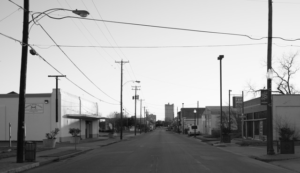 Elm Avenue – When you visit Elm Avenue, the beautiful historic buildings remind you that it was once a thriving business district before a terrible flood in 1936 overwhelmed East Waco. My favorite is to grab a coffee and breakfast pie at Lula Jane’s (406 Elm) and then take pictures with friends around the murals and historic buildings.
Elm Avenue – When you visit Elm Avenue, the beautiful historic buildings remind you that it was once a thriving business district before a terrible flood in 1936 overwhelmed East Waco. My favorite is to grab a coffee and breakfast pie at Lula Jane’s (406 Elm) and then take pictures with friends around the murals and historic buildings.
Farmers’ Market (400 S. University Parks Drive) – Every Saturday morning, you can expect to find the Waco Farmers’ Market behind the old Fire Tower along the Brazos River. Strawberry and Nutella crepes by Co-Town Crepes are my preferred indulgence.
Graffiti, Murals and Art – Elm Avenue isn’t the only place with beautiful art. Some are in plain view in downtown while others will take a little more work to find. Here are a few to get you started: the Martin Luther King Jr. mural (near the Suspension Bridge), the Starry Night mural (corner of 10th St and Columbus Avenue) and the “You Look nice today Wacotown” mural (corner of Sixth St and Washington Avenue).
Hippodrome Theatre (724 Austin Ave) – The Hippodrome is not your typical movie theatre. It comes with a complete full service in-theatre dining and a restaurant and bar overlooking Austin Avenue. They show first run movies, but the best experience is their special movie screenings of older movie favorites. Looking forward to “Rocky Horror Picture Show” coming up in a few weeks! (October 28)
Indian Spring Park (across from the Hilton on University Parks) – As a kid, I remember when Indian Spring Park only had a few longhorns. Now there’s a herd! One thing is for certain, there are definitely more people at the park; I guess we have Pokémon Go to thank for that.
Jake’s Texas Tea House (613 Austin Ave) – In this 50’s themed restaurant, you can always find great banana pudding, and if you’re lucky Elvis and Marilyn Monroe will show up.
Kayaking and Water Activities – There are so many activities to enjoy in the Brazos River including kayaking, wake boarding, fishing or if you’re feeling fancy, you could charter a boat for a tour of the Brazos River. (Bicycle World for canoe/kayak rentals, Waco River Charters)
 Lofts – The historic lofts make the downtown living experience different than any other part of Waco. The historic Waco High campus, many factories and warehouses have all been transformed into beautiful high-end living spaces perfect for young professionals. (Historic Lofts at Waco High – 815 Columbus Ave)
Lofts – The historic lofts make the downtown living experience different than any other part of Waco. The historic Waco High campus, many factories and warehouses have all been transformed into beautiful high-end living spaces perfect for young professionals. (Historic Lofts at Waco High – 815 Columbus Ave)
Magnolia Market (601 Webster Ave) – We can’t talk about downtown without mentioning Chip and Joanna Gaines of “Fixer Upper” fame. No trip to Waco is complete without an obligatory selfie at the Silos.
Nightlife – Downtown Waco has an amazing nightlife with a variety of bars to choose from that all offer a unique experience such as Halftime, Trojans and Crickets. Every first Friday of the month, businesses stay open later than usual for a fun experience with live music and great food. (First Fridays)
Old Buildings – Every building in downtown has a story to tell. The best way to discover the secrets and people behind the buildings is to download the Waco History app on your phone. It allows you to read feature stories on influential people and locations in Waco as well as pinpoint every location on a map so that you can truly experience Waco’s rich past.
Parades – Waco never misses an opportunity to close the streets of downtown for a fun parade. As a kid, my parents took me to downtown to see the Baylor homecoming parade. Little did I know, I would be attending Baylor years later. (Baylor Homecoming Parade – Saturday October 15)
Quack! Quack!: Cameron Park – When I think of Cameron Park, I associate it with quacks as the ducks huddle around the bank of the Brazos River. Throughout the park, you see bikers and joggers, families barbecuing, college students playing disc golf and children laughing as they splash away the hot weather in the spray pad.
River walk: Brazos River – On one side of the river you can enjoy the beauty of Cameron Park while the other side offers Bledsoe-Miller Park and Manny’s on the River as well as Buzzard Billy’s.
 Suspension Bridge – At the edge of downtown, the historic Suspension Bridge connects both sides of town. While you’re on the bridge, bring some tortillas to take your chance at tossing them onto a concrete installment isolated in the Brazos River.
Suspension Bridge – At the edge of downtown, the historic Suspension Bridge connects both sides of town. While you’re on the bridge, bring some tortillas to take your chance at tossing them onto a concrete installment isolated in the Brazos River.
Texas Food Truck Showdown – Three-dozen food trucks invade Heritage Square in the spring to determine which truck truly serves the best food Texas. If you can’t wait until April for the next showdown, you can go down Franklin Avenue on the Brazos River to try out the row of food trucks. (Third Annual Showdown – April 1, 2017)
Upscale Restaurants - As much as we all love our food trucks, farmers markets and fast food, downtown is also a great place to find more upscale restaurants and venues for your special event such as the Phoenix Ballroom, DiamondBack’s or Klassy Glass Wine Bar.
Vendors: Restaurants & Stores – Where’s the middle ground between fast and fancy? While you are in downtown don’t forget to visit Dichotomy, Portofino’s and the shops of River Square Center.
Waco Wonderland – Each year in Heritage Square, there is a holiday parade, ice-skating rink, Ferris wheel, carousel and you can take pictures with Santa Claus. The tree lighting is something truly magnificent. (Waco Wonderland)
Xristo’s Café (Corner of Franklin Avenue and University Parks Dr.) – Xristo’s is a one of a kind mobile café serving southern, Mediterranean and Turkish cuisine.
Youth – Downtown Waco is the perfect environment for any college student, recent graduate or young professional to live in after landing their first job.
Zoo (1701 N 4th ST) – Lastly, while you’re in downtown, venture out a little further to reach Cameron Park Zoo. I only got to experience the zoo as a teenager and an adult, but it is still a fun time getting to see the animals and nature.
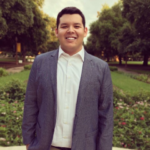 Rolando Rodriguez Soto was raised in Waco, TX, and he is currently attending Baylor University with plans to graduate in December 2016 with a Bachelor of Arts in Professional Writing & Rhetoric. After graduation, he hopes to work in Waco in the nonprofit sector to help realize the full potential of Waco. His long term goals include hopefully creating and publishing creative work whether that is a novel, short story or even a television show.
Rolando Rodriguez Soto was raised in Waco, TX, and he is currently attending Baylor University with plans to graduate in December 2016 with a Bachelor of Arts in Professional Writing & Rhetoric. After graduation, he hopes to work in Waco in the nonprofit sector to help realize the full potential of Waco. His long term goals include hopefully creating and publishing creative work whether that is a novel, short story or even a television show.
The Act Locally Waco blog publishes posts with a connection to these Aspirations for Waco. If you are interested in writing for the Act Locally Waco Blog, please email [email protected] for more information.
By Terry Roller
Waco recently received a Cultural Arts District designation from the State of Texas. To many, it is a great thing. To others it is too esoteric, elitist, and a waste of “their” money.
Let me share a brief story as to why I think it IS a big deal and is deserving of support and nurture, why it brings value to all citizens. My wife is originally from Springfield, Illinois. Her family is still there. I will have to say that over much of the thirty-six years she and I have been married, Springfield, especially being the capital of a state as significant as Illinois, wasn’t much of a place to visit multiple times. There didn’t seem to be much to do once one had done all the obvious Lincoln sites. But for a number of the nearly thirty-four years I have lived in Waco, Springfield had one thing that Waco did not have: a certain department store that shall remain nameless. I really liked the merchandise selection, and the prices, especially sale prices. That gave me something to look forward to when we visited.
Well, in the intervening years, the same department store came to Waco—so much for an incentive to visit Springfield other than visiting in-laws of course. Now, having the same store close to home takes some of the shine off the experience of shopping there. Convenience breeds complacency. This is something I have heard referred to as the “Six Flags effect” which says that if one lives very near Six Flags, it really isn’t a big deal. Even the Bible gives an example in the story of the prophet in his own hometown.
So what does this have to do with the Waco Cultural Arts designation? Large corporations have edged out the mom and pop shops and other small businesses in cities and small towns throughout the country, including Waco. Cities and towns have come to look more and more alike, with the same retailers and restaurants, with the same logo-branded clothing, with the same architecture-as-logo buildings, the same non-descript metal buildings built for economy over aesthetics or style. One remaining unique characteristic that can and does make one community different from others is its local arts scene including, visual and performing arts, music, regional architecture, cultural and historic museums.
Anyone can participate in the arts at whatever level they desire or that their talents or interests allow, whether as artists or performers themselves, as aficionados, collectors, or just as observers or browsers. It isn’t required that one be a Sinatra, or Celine Dion, Madonna, Johnny Cash, Picasso, Whistler, John Wayne, or Meg Ryan, or a Gugenheim level collector. In fact, the broad spectrum of taste, talent and style found in each community adds to its unique artistic nature.
Because tourism is to some degree or other such a vital part of the economy of every town or city, it only makes sense for those communities to make the most of what makes that town or city unique and worth visiting, that make it different from another, even unique. That uniqueness thrives in the local arts scenes. Take Taos, Miami, or New York, for example. Even the nearby small town of Clifton, Texas, benefits greatly from its local arts scene. It is hard to deny that the arts, as a part of Clifton’s economy, far outpaces not only other communities its size, but also that of larger towns and cities. Granbury is another small town example. The citizens and merchants there stage arts and crafts events many times a year drawing substantial numbers of visitors. The more local citizens participate in their own local arts scene, the more they desire to do so in other communities as well, therefore becoming arts tourists and possibly even aficionados.
Now that Waco is a designated Cultural Arts District, it is up to the Waco citizens not only to capitalize on the designation, but also to participate as fully as possible for their own enjoyment. Festivals take effort, volunteers, support, leadership, planning, financing, promotion, and local participation to grow to the point of attracting the attention of those who would travel to Waco to participate. Volunteers or even visitors don’t have to love the arts, just love Waco and want to have a part in its future. And if nothing else, arts events, businesses, and institutions need audiences. It takes solid local audiences to help build the critical mass for others to travel to these events. That is something every citizen can do. They can attend and they can spread the word. Don’t assume because an event is close to home that it can’t be quality.
Kudos to Fiona Bond, Chris McGowan, Megan Henderson, Doreen Ravenscroft, Baylor, MCC, The Waco Art Center, and countless others for all they have done to bring the Cultural Arts District designation about. We have a great start due to the vision, hard work, and dedication of those community leaders mentioned earlier and many others. Anything that benefits the economy, that benefits even a part of a community benefits all citizens of the community. So, let’s go Waco.
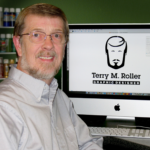 Terry Roller, Prof. Emeritus of Graphic Design, came to Waco after teaching at Eastern Illinois University to take a similar position at Baylor University in 1983. He retired from Baylor after 33 years this August. He has also been a partner and performer in the Stars Over Texas Jamboree, a first-Thursday-of-the-month, Branson-type musical stage show at the Lee Lockwood Library and Museum since its inception in 2010. His wife Janet teaches second grade at Waco Charter school where she also teaches a weekly art class for several grades. They have one daughter, Lauren, who works for Magnolia in public relations.
Terry Roller, Prof. Emeritus of Graphic Design, came to Waco after teaching at Eastern Illinois University to take a similar position at Baylor University in 1983. He retired from Baylor after 33 years this August. He has also been a partner and performer in the Stars Over Texas Jamboree, a first-Thursday-of-the-month, Branson-type musical stage show at the Lee Lockwood Library and Museum since its inception in 2010. His wife Janet teaches second grade at Waco Charter school where she also teaches a weekly art class for several grades. They have one daughter, Lauren, who works for Magnolia in public relations.
The Act Locally Waco blog publishes posts with a connection to these aspirations for Waco. If you are interested in writing for the Act Locally Waco Blog, please email [email protected] for more information.
By Diego Loredo
I know how stressful college can be! It can go from one week of relaxing and not having any work to having a huge amount due in such a short period of time. It can all be overwhelming, and sometimes it’s just too much to handle.
I’ve had numerous experiences of being stressed out during the time I’ve been at UNT so far. I was already stressed out early into this semester when I had to do a communications audit for a nonprofit. The nonprofit ended up not being able to work with me, and I had to find another one and do the audit in a really short period of time. Luckily, I managed to get it done in time. I’ve tried a few things to help manage my stress and here’s a few that I found to be particularly helpful.
Exercise
I usually play soccer with my friends whenever we can all get together. Whether it’s through intramurals or just getting together and kicking a ball around, it always helps clear my mind. It doesn’t have to be soccer though, it can be working out, playing other sports, or just going for a run.
Go out with friends
I know this is pretty obvious but that’s why it’s such a good method to relieve stress. Take time to go out with people that you’re comfortable with. Don’t just stay inside all the time; go out and experience new things. Whenever my friends and I go out, we usually go out of town and find new things to do. These include playing Top Golf, going to the outlets in Allen, or going to a FC Dallas game. Take some time to stop doing so much work and have fun with those close to you.
Manage your time efficiently
Don’t push everything off to the last minute. Try to get it done early or at least a few days before it’s due. Not only will you be stressing out because you procrastinated so much, but it will also affect your grades because you didn’t put as much time into it as you should have. Mark down all of your due dates on the calendar or go to the library once or twice a week to do work. Just make sure you manage when you do school work well.
I know college can be hard and I know sometimes it can be too much to handle. Honestly, it’s just one of those things that comes with going to college. There are going to be stressful days and there are going to be times when you just want to give up. I know how it feels and I’ve been close to giving up several times. Luckily I’ve encountered people who have become close to me and helped me through it all. Also I’ve learned new ways to manage my stress. I’m still learning how to manage my stress well and I hope these tips can help any college student relieve their stress.
 Diego Loredo is a junior at the University of North Texas and is majoring in public relations. He graduated from University High School in 2014. He plans on working in sports PR or for a nonprofit. He loves to play soccer and is a huge FC Dallas fan. Have something that you would like Diego to write about or have a problem that you would like to ask him? Shoot him an email at [email protected].
Diego Loredo is a junior at the University of North Texas and is majoring in public relations. He graduated from University High School in 2014. He plans on working in sports PR or for a nonprofit. He loves to play soccer and is a huge FC Dallas fan. Have something that you would like Diego to write about or have a problem that you would like to ask him? Shoot him an email at [email protected].
The Act Locally Waco blog publishes posts with a connection to these aspirations for Waco. If you are interested in writing for the Act Locally Waco Blog, please email [email protected] for more information.
By Cynthia Cunningham
My daughter has bipolar disorder. There! I said it. Ten years ago I said aloud those scary words that send many of my family and friends into hiding. But why? This diagnosis just means that her brain has some problems maintaining her moods, activity levels and often just completing daily tasks. That doesn’t sound like something to be afraid of, does it?
But yet, our society is afraid! We’ve been taught for centuries that mental illness is a bad thing to be fearful of. Look at any social media and you will see memes using mental illness as a joke. And today, you can hardly go a day without hearing the words that apply to mental health issues. “He is acting so schizo!” “This weather is crazy!”
Somehow we forgot to use the correct language. And by using words that are associated with mental health conditions, without even realizing it, we have once again stigmatized mental illness. By keeping the stigma alive against mental illness, we shame those who are living with this condition. Isn’t that the bullying that we have been teaching our children not to do to others? Not sure this is offensive? Test yourself: replace any of the words used for mental health with the word “Cancer”. Is it still funny?
Did you know that 1 in 4 people live with a mental health condition? If these numbers don’t catch your attention, try these:
- There are an estimated 80,022,714* people living in the U.S. with a mental health condition.
- There are an estimated 6,923,821* people living in Texas with a mental health condition.
- There are an estimated 65,802* people living in Waco with a mental health condition.
That’s a lot of people that we are offending with our words! And those words cause people to want to hide away and not seek help. Instead they try to handle these illnesses themselves, or chose not to acknowledge that there is even anything wrong. Some are so overcome with the pain of dealing with the mental illness that they chose to end the pain. And we can stop this! We MUST stop this!
So how can we fix it? We need to start the conversations that let people know that it is ok to talk about mental illness. Luckily, there is just such an initiative that was launched in Texas! The Meadows Mental Health Policy Institute launched OkayToSay.org this year. This initiative increases awareness that most mental health conditions are treatable. It gives hope to those affected by these conditions.
Since this is a Texas-based initiative, any and all Texans can contribute. You can join those who have already posted, like President George W. Bush, Emmitt Smith, and Mark Cuban. This website shows you a few different ways to “make it okay to say.” You can share your own personal story, add your name to the support wall, you can post a video telling others how it is ok to talk about mental illness. You can even select to share messages on your social media and invite others to share their voices.
The real importance of this initiative is to get the conversations going about how important it is to talk about mental health conditions. Right now there is a nationwide shortage of psychiatrists. Often when someone decides to seek help they face a long waiting period just for the initial visit. And that is if they have insurance. Those without insurance coverage must rely on other local programs, which are also quite busy. By having conversations, we can start raising awareness and addressing issues with our political representatives to get more focus on services and programs that are really needed to address these health issues.
I am a living example of how talking about mental illness makes a difference. I spoke up for my daughter, got her the medical help she needed and got education for our whole family so we could learn how to help her live a life of recovery with her mental health condition. Today she is my pride and joy. She is happily married and works as a Certified Peer Support Specialist for NAMI Waco. Her job, along with our other 11 peers, is part of our free Peer Support program for people who have a mental health diagnosis and seek to improve their health.
I was once asked why I talked so openly about my daughter’s illness. My reply was “No one ever told me not to talk about it and I realized that the more I talked the more I learned and could help her and others.” As a result, I learned about NAMI.org. A grassroots organization that’s purpose is to educate, support and advocate for those whose lives have been affected by a mental health condition. This was just what my family needed! And I found it by speaking out! I am pleased to say today I work for the local affiliate, NAMI Waco, doing a job that I love. I am one person, but I can make a difference! I am doing my part to help others through this difficult journey. And I hope others will join me!
It is really simple to do! This work was started earlier this year in Waco by a mental health committee of Prosper Waco and we want to make it spread. It is quite simple to use. Just go to OkayToSay.org, search “in your area” and click on “share your story”. Let’s all make it OkayToSay!!!!
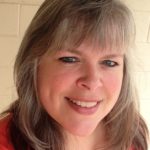 Cynthia Cunningham, a Wacoan since age 2, is the Executive Director for NAMI Waco. She lives with her husband of 28 years, Bobby, and two spoiled dogs and one royal cat! Her passion is educating others about mental health. She can be contacted at: www.NAMIWaco.com
Cynthia Cunningham, a Wacoan since age 2, is the Executive Director for NAMI Waco. She lives with her husband of 28 years, Bobby, and two spoiled dogs and one royal cat! Her passion is educating others about mental health. She can be contacted at: www.NAMIWaco.com
The Act Locally Waco blog publishes posts with a connection to these aspirations for Waco. If you are interested in writing for the Act Locally Waco Blog, please email [email protected] for more information.
*using data from the projected 2015 census
By Nick Atkins
On February 29th, I received the email. I had been accepted into the MUNY/Webster Intensive, a three-week musical theatre intensive in St. Louis, Missouri. (MUNY is short for the Municipal Theatre Association of St. Louis.) I would participate in workshops, take classes at Webster University, and 0perform in the MUNY’s production of Mamma Mia with professional Equity actors in front of 10,000 people a night.
Four months earlier, Waco High’s Technical Theatre Director, Cory Garrett, asked me to audition. He believed I could best represent not only Waco High, but also Waco itself. So I began the application process, including preparing three separate videos—a monologue, a song, and a dance performance. I didn’t know at the time that only eleven students from across the country would be selected.
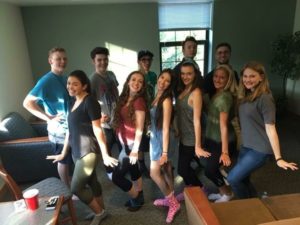 When I walked in to the boys’ dorm, I found myself greeted with high fives, handshakes, and stories of our hometowns. Alex from Canada, Harrison and Miller were both from Kentucky, and the other Harrison was also from Texas. We were told to go to the living room for a “team meeting.” While we were waiting for the girls, we heard thundering from the hallway. From around the corner, six girls came in, squealing in excitement that the last of the group had finally shown up. Brooke and Becca were from Florida, Karissa and Rachel lived in California, Tori was from a small town outside Boston, and Anika was a Rhode Island girl. Of my three weeks in St. Louis, that first day was one of the best. We all sat there in a circle, learning about each other, telling stories from our hometowns, listing the roles we had played in performances. It was that night that I realized how close theatre really brings people together. We all came from different places, different backgrounds.
When I walked in to the boys’ dorm, I found myself greeted with high fives, handshakes, and stories of our hometowns. Alex from Canada, Harrison and Miller were both from Kentucky, and the other Harrison was also from Texas. We were told to go to the living room for a “team meeting.” While we were waiting for the girls, we heard thundering from the hallway. From around the corner, six girls came in, squealing in excitement that the last of the group had finally shown up. Brooke and Becca were from Florida, Karissa and Rachel lived in California, Tori was from a small town outside Boston, and Anika was a Rhode Island girl. Of my three weeks in St. Louis, that first day was one of the best. We all sat there in a circle, learning about each other, telling stories from our hometowns, listing the roles we had played in performances. It was that night that I realized how close theatre really brings people together. We all came from different places, different backgrounds.
The next two weeks were hectic, sweaty, and amazing. Every morning, we’d all wake up, get dressed in whatever our color of the day was, and head to rehearsal at 10 o’clock. The eleven of us were in the ensemble, meaning we learned the music for every song, and were on stage numerous times dancing. One day I was on the side of the rehearsal studio waiting for my cue to come on. There was an adult Equity ensemble member waiting with me named Kevin Zak. He noticed how quiet I was and decided to make some conversation. We started talking about theatre and how we got into it. I jokingly asked how many Broadway shows he had been in and he answered with, “Well I was in the original Off-Broadway Cast of Clinton: The Musical.” My jaw dropped. I asked him what part he played. Ken Starr. I met the man that played Ken Starr in Clinton: The Musical.
Our evenings were different each night. We got to see the MUNY’s production of both The Music Man and Young Frankenstein. We had three workshops and got to work on our college audition pieces with choreographer Josh Rhodes, actress Julia Murney, and actress Nancy Opel. One night, we went to a place called The City Museum. At first, I just expected a history museum with exhibits pertaining to St. Louis, but it was actually a giant playground. Three glorious stories of mazes, jungle gyms, and slides. We were all so tired after that, we totally forgot about our midnight tech rehearsal that next day.
At the MUNY, the musicals have two weeks to rehearse and one week of performance. When a show ends, the next musical has a “midnight tech” rehearsal in which the sound, lighting, and set elements are put to the test just hours before the opening. The Mamma Mia midnight tech rehearsal went so smoothly, we were headed home around 11:45. That afternoon, the cast got together for “sweat tech”, a last minute run through of the show in the sweltering St. Louis afternoon.
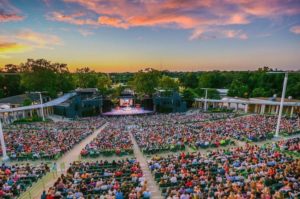 Then came the fun part. Opening night. We arrived thirty minutes early to get our microphones and costumes ready, and headed to our places. For most of us, our first dance number wasn’t until a few scenes into the show, but a few of them were in the opening scene. After that first scene, they came back with their jaws dropped. It was packed. 11,000 seats, filled to the brim. My first number, “Lay All Your Love”, where I waddled onstage with four other guys in flippers and goggles and did a little dance in front of two leads, I glanced out to the crowd to get a good look and I nearly forgot my dance and stopped right there. I had never seen that many people in an audience. It was truly beautiful.
Then came the fun part. Opening night. We arrived thirty minutes early to get our microphones and costumes ready, and headed to our places. For most of us, our first dance number wasn’t until a few scenes into the show, but a few of them were in the opening scene. After that first scene, they came back with their jaws dropped. It was packed. 11,000 seats, filled to the brim. My first number, “Lay All Your Love”, where I waddled onstage with four other guys in flippers and goggles and did a little dance in front of two leads, I glanced out to the crowd to get a good look and I nearly forgot my dance and stopped right there. I had never seen that many people in an audience. It was truly beautiful.
During the performance week, we took classes at the Webster campus during the day. We all referred to it as “Webster Week”. We took yoga, improv, dance, and acting classes. Lara Teeter, the head of the musical theatre program at Webster, worked with us on college audition pieces alongside Tim Ocel and Ron McGowan. Together, they helped us with every aspect of Musical theatre. I learned things that week that I can use in any part I play. I have already used some of the tips for my part in Waco High’s production of The Little Mermaid.
T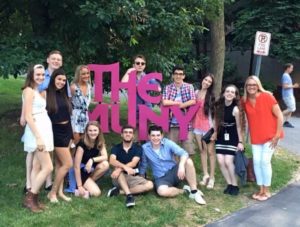 he one question I always get when talking about this trip is, “What was your favorite part?” That becomes harder and harder to answer every time I look back on it. I learned a lot in the Webster classes, and had a blast performing in Mamma Mia. However, those memories would not have been so amazing if not for the other ten people that were with me 24/7. These people are lifelong friends. Some of the most fun times were at the dorms after rehearsal when we crashed on the couches and talked. We shared every meal together. We would stay up late just to practice dances together so we knew we had it down. These ten people are all so talented; I have no doubt in my mind that they will all do amazing things in the future, not necessarily in acting. They aren’t just great actors, great singers, or great dancers. They are all great people. In our workshop with Julia Murney, she said something that stuck with all of us: “You’re worth more than a 5, 6, 7, 8”.
he one question I always get when talking about this trip is, “What was your favorite part?” That becomes harder and harder to answer every time I look back on it. I learned a lot in the Webster classes, and had a blast performing in Mamma Mia. However, those memories would not have been so amazing if not for the other ten people that were with me 24/7. These people are lifelong friends. Some of the most fun times were at the dorms after rehearsal when we crashed on the couches and talked. We shared every meal together. We would stay up late just to practice dances together so we knew we had it down. These ten people are all so talented; I have no doubt in my mind that they will all do amazing things in the future, not necessarily in acting. They aren’t just great actors, great singers, or great dancers. They are all great people. In our workshop with Julia Murney, she said something that stuck with all of us: “You’re worth more than a 5, 6, 7, 8”.
Nick Atkins is currently a senior at Waco High School. He is involved with the varsity choir, show choir, theatre program, NHS, and mascot at WHS. He would like to thank his family and all of his directors for giving him the courage to pursue theatre. After high school Nick plans on getting a BFA in Musical Theatre.
By Ashley Bean Thornton
(Warning: Really bad metaphor ahead! Don’t read if you are sensitive to overwrought literary conceits.)
For my fortieth birthday I bought myself a ukulele. Except for a few dutiful piano lessons in Jr. High, I had never played an instrument. I thought it might be interesting to celebrate middle age by stretching my brain in a new direction. I picked ukulele because…4-strings… how hard could it be?
I was partly right. Playing the ukulele wasn’t all that hard. In fact, with a little practice, I had a great time playing it! I fell in with a few goofy friends from Baylor and we formed a little ukulele band. (The “Free to Be Uke” Players — get it?) We had a blast! We even did a little Christmas sing-a-long in the Student Union Building much to the – delight? bemusement? annoyance? – of the students passing by on their way to take their final exams.
The hard part about the ukulele wasn’t learning how to play it, it was learning how to tune the darn thing. This was so frustrating to me that sometimes I tried to skip the tuning and just play…but, it sounded terrible, and that wasn’t any fun. Usually (probably out of a desire to preserve his own sanity) my much-more-musical-than-me husband would end up volunteering to tune it for me. I would hand it over, and he would patiently pluck each string, listening carefully while he tightened and loosened first one then another until finally – magically, it seemed to me — he would strum a few chords, and it would all sound good together.
I haven’t played my ukulele in a few years now, but I still think pretty often about the notion of “tuning.” Tuning is hard to do, but it’s a simple idea really. A string is stretched between two end points. The quality of the music depends on finding and maintaining the right tension between those end points.
It’s interesting (at least to me) to note that no one would ever say that one or the other end point between which the ukulele string is stretched is “right” or “wrong.” That doesn’t even make any sense. Both end points are necessary. The tension between them is what makes the music possible, and adjusting that tension is what makes the music sound good or bad.
It’s a simple idea, but I had never thought about it before, and it struck me as pretty profound. It helps me understand what is necessary when two true and good things seem to be opposed to each other – a condition that comes up constantly.
Think of all the pairs of “end points” you tune between on a regular basis in your personal life: striving and resting, independence and interdependence, confidence and humility… One end point isn’t “right” and the other “wrong.” They are both important. We have no choice but to take on the sometimes frustrating, sometimes rewarding task of loosening, tightening and listening to get the tension right between them so that the music of our lives sounds good.
I’m thinking about all this today because I just got home from a weekend trip to Austin to attend a thing called “Tribfest.” It’s basically an annual 3-day political “wonk-fest” put on by The Texas Tribune, my favorite news source for all things having to do with Texas politics. Tribfest is billed as “your chance to engage with politicians, industry leaders and journalists as they explore issues critical to Texas.” While there I got to hear, among other things, interviews with John Kasich and Ted Cruz, and bi-partisan panel discussions on all kinds of topics from the STAAR test to the appropriate relationship between faith and government. The conversations were by turns fascinating, frustrating, terrifying and hopeful.
Throughout the weekend, the idea of “tuning” has been playing in the back of my mind. The whole Tribfest was full to the brim with examples of the exact kinds of things I’m talking about above — true and good ideas that seem opposed to each other:
- Personal freedom/public good…
- Regulations to protect our environment/flexibility to do business in a profitable way…
- Giving our teachers the freedom to teach/holding our school systems accountable for learning…
- Wise frugality/ wise investment…
- Protecting second amendment rights/Protecting ourselves against gun violence…
The most hopeful conversations I heard were the ones where our leaders (elected and otherwise) seemed to understand the notion of tuning – where they understood that both end points are necessary to make the music and we have to tighten and loosen and listen until we find the right pitch.
The most discouraging and even scary conversations were the ones where the players didn’t seem to understand how the instrument worked at all, much less how to tune it. In these conversations the misguided leaders seemed bent on convincing us that the tension between the two end points was bad, and that whichever end point they stood on, the other end point had no value at all.
My weekend at Tribfest has left me wondering if “we the people” are taking enough responsibility for keeping our “ukulele of democracy” in tune. (Did I warn you there was a terrible metaphor coming? Why, yes, I did…)
What is our part? We can reject the nonsensical and dangerously simplistic notion that our most complex political challenges are simple binary choices – that one end point is good and the other is bad. We can stop talking that way among ourselves, and we can stop cheering for that kind of talk from our leaders.
We can develop habits of thought more appropriate for the complex nature of the challenges we face. We can learn to tighten and loosen and listen in our own conversations, and we can support leaders who do the same. The political discourse in Texas, and in the country sounds terrible right now…and that’s no fun. Tuning is hard work, but it’s necessary to turn this noise into something that we can stand to listen to, much less sing along.
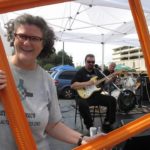 This Act Locally Waco blog post is by Ashley Bean Thornton, she works at Baylor, helps out with Act locally Waco, and facilitates the Waco Foundational Employment Network which is a part of Prosper Waco. She likes to walk and doesn’t mind at all if you honk and wave when you see her.
This Act Locally Waco blog post is by Ashley Bean Thornton, she works at Baylor, helps out with Act locally Waco, and facilitates the Waco Foundational Employment Network which is a part of Prosper Waco. She likes to walk and doesn’t mind at all if you honk and wave when you see her.
The Act Locally Waco blog publishes posts with a connection to these aspirations for Waco. If you are interested in writing for the Act Locally Waco Blog, please email [email protected] for more information.
By Joel H. Scott, Ph.D.
With a rich history of critically considering how faith informs hunger alleviation while nurturing people, the land, and community, World Hunger Relief, Inc, (WHRI) is a robust, life-giving organization. As the new Director of Development & Outreach, it’s my privilege to share with Act Locally Waco followers about one of the more unique not-for-profits in the United States.
So what’s WHRI? (affectionately know as “the Farm”)
 WHRI is a faith-based organization committed to the alleviation of hunger both locally and around the world.
WHRI is a faith-based organization committed to the alleviation of hunger both locally and around the world.
For 40 years WHRI has been training individuals in holistic ministry that equips for work with communities in developing sustainable agriculture, motivating individuals and communities to live sustainably and advocate on behalf of the poor, and partnering with like-minded organizations to address hunger related issues facing our local and global communities.
Where is it?
Our Physical Address is 356 Spring Lake Rd Waco, TX 76705. We are located on 40 acres just north of Waco off Hwy 77 (From I-35 Exit 342B).
So what does this training, motivating, and partnering really mean for Waco today? (Read on! The following is a snapshot of our mission in action)
 Training: WHRI has individuals from all over the world who serve as interns or live-in volunteers for 13 months and train in sustainable agriculture, spiritual development, and community engagement. WHRI has trained more than 350 interns working in 20 countries spanning 4 continents. Interns work for various domestic international organizations promoting sustainable food production and economic development. Many graduate and work for agencies in our greater Waco community such as intern Bethel Erickson-Bruce who pioneered the widely popular Waco Downtown Farmers Market in 2011.
Training: WHRI has individuals from all over the world who serve as interns or live-in volunteers for 13 months and train in sustainable agriculture, spiritual development, and community engagement. WHRI has trained more than 350 interns working in 20 countries spanning 4 continents. Interns work for various domestic international organizations promoting sustainable food production and economic development. Many graduate and work for agencies in our greater Waco community such as intern Bethel Erickson-Bruce who pioneered the widely popular Waco Downtown Farmers Market in 2011.
Currents interns represent several U.S. states and South Africa. This fall interns will be coming to train at the Farm from our international partnerships in Liberia and El Salvador.
Motivating/Educating: Each year, dozens of local organizations and faith communities (all ages) come to the Farm to wrestle with issues of food insecurity, corruption, and unequal distribution through our “Living on the Other Side” (LOTOS) experiential education exercises. Groups are empowered to consider responsible ways to alleviate modern day issues such as food deserts in their own communities.
 The Veggie Van: WHRI’s mobile food source, launched in 2014 to provide high quality, affordable vegetables in identified food deserts in Waco. In that time, WHRI has built relationships in the local food system (i.e. the farmer’s market vendors, other non-profits, local businesses, government officials, etc.) to reach some of the most vulnerable populations in Waco—senior citizens, the working poor, children from generational poverty and those living in underserved neighborhoods. The Veggie Van also serves as mobile educational tool for promoting awareness of local food deserts.
The Veggie Van: WHRI’s mobile food source, launched in 2014 to provide high quality, affordable vegetables in identified food deserts in Waco. In that time, WHRI has built relationships in the local food system (i.e. the farmer’s market vendors, other non-profits, local businesses, government officials, etc.) to reach some of the most vulnerable populations in Waco—senior citizens, the working poor, children from generational poverty and those living in underserved neighborhoods. The Veggie Van also serves as mobile educational tool for promoting awareness of local food deserts.
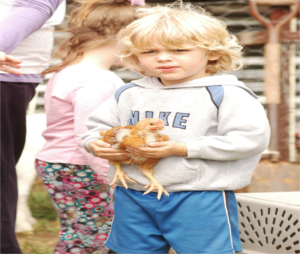 Farm Camp: During the summer, WHRI introduces Waco area children to the wonders of simple living, sustainable agriculture. Through this camp, children get to try new foods – picked fresh and warmed by the summer sun – and create a new relationship with food and the land. For more information about next year’s camp, please check out our website after February 1, 2017.
Farm Camp: During the summer, WHRI introduces Waco area children to the wonders of simple living, sustainable agriculture. Through this camp, children get to try new foods – picked fresh and warmed by the summer sun – and create a new relationship with food and the land. For more information about next year’s camp, please check out our website after February 1, 2017.
Guided Educational Tours: Over 1,300 folks visited the Farm last year on tours. WHRI has tours tailored to meet a variety of interests. We customize farm visits to fit curriculum, TEKS requirements, or learning objectives of any age or grade. We encourage visitors to consult the staff at WHRI before your visit and plan your farm experience; this can include service projects, meaningful work experiences, and pre/post-visit interactions.
Partnering: WHRI’s School Gardening Program partners with Waco ISD and local organizations in developing healthy, sustainable communities through the education and exploration in our school gardens. Currently school gardens are located at J.H. Hines Elementary, Indian Springs Middle School and G.W. Carver Middle School. We also support the Heart of Texas Urban Garden Coalition (HOT UGC) in many community wide initiatives.
Executive Director Matt Hess serves as co-chair of Live Well Waco the Healthy Eating Healthy living arm of Prosper Waco. This group has a focus on reducing obesity in McLennan County. The group is developing a Healthy Eating Active Living Plan; managing a grant from the USDA aimed at increasing awareness of healthy eating opportunities in Waco such as the Veggie Van, the Waco Downtown Farmers Market, and community gardens; and has recently been accepted as a finalist in the Healthiest Cities and Counties Challenge.
WHRI is widely known and respected for its stewardship of partnerships and relationships. We take seriously the call to join like-minded forces through consultation and collaborative endeavors, rather than competing or duplicating work.
If I want to begin a relationship with World Hunger Relief and become a “Friend of the Farm” what’s a good first step?
- E
 mail [email protected] or call World Hunger Relief’s main office (254)-799-5611and request a guided tour of the Farm.
mail [email protected] or call World Hunger Relief’s main office (254)-799-5611and request a guided tour of the Farm. - Stop by our Veggie Van during the week and at the Downtown Farmer’s Market on Saturdays.
- Visit our website at http://worldhungerrelief.org/ and request our Newsletters and Farm Notes.
- Like and Follow us on Facebook @whriwaco and share with your network.
- Purchase a fall dinner ticket and join us for “A Night on the Farm” Dinner & Celebration on Oct. 21st or 22nd. Tickets will be available here October 1st.
- Organize a group to experience our LOTOS or service learning programs offered year-round.Email our Local Education team to schedule service learning opportunities: [email protected].
- Come out and experience our infamous Spring Farm Day in April 7th, 2017.
- Email Joel Scott @ [email protected] He’d love to meet with you for coffee and discuss all things Farm.
- If you are already a supporter of the Farm, we are currently in a Match Month. The JES Foundation is doubling every dollar given up to $40,000 through Oct 1st. You can give directly online through our website http://worldhungerrelief.org/donate/
We’re grateful for WHRI’s legacy of stewardship, and our robust base of volunteers and supporters who share their talents, time and treasures. As the Farm strategically considers the next 40 years of mission-centric work, we look forward to forging new relationships, partnerships, and approaches to more faithfully address how we nurture people, the land, and community.
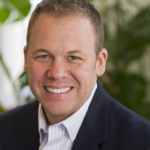 Joel Scott is the new Director of Development & Outreach at World Hunger Relief, Inc. He recently served on faculty at Boston University and worked in higher education administration, capacity consulting, and leadership for the past 15 years. His primary scholarship involves community-university engagement and service-learning. Joel is looking forward to fall backyard barbeques, driveway basketball, and living a more integrative life.
Joel Scott is the new Director of Development & Outreach at World Hunger Relief, Inc. He recently served on faculty at Boston University and worked in higher education administration, capacity consulting, and leadership for the past 15 years. His primary scholarship involves community-university engagement and service-learning. Joel is looking forward to fall backyard barbeques, driveway basketball, and living a more integrative life.
The Act Locally Waco blog publishes posts with a connection to these aspirations for Waco. If you are interested in writing for the Act Locally Waco Blog, please email [email protected] for more information.
By Craig Nash
“The Texas Hunger Initiative is a capacity-building collaborative organization… “
So begins the official description of what my organization does. Like most first words of a mission statement, it is full of all the pretty phrases, designed to make you feel good about what is coming next. And when it works, it does create positive energy, but “collaboration” can be one of the most difficult tricks to pull off in the non-profit world. And as we all know, you can delete “non-profit” from the previous sentence and it functions just as well.
Working together isn’t something we are hardwired to do. A visit to the nearest playground right before naptime will provide sufficient evidence of this fact. But by the end of adolescence and the beginning of adulthood, we begin to understand, whether by intuition or inculcation, that it is something we should do– If for no other reason than to get a “Works well with others” stamp beside our name.
Having spent some of my time in ministry, and much (read: all) of my life in churches, the inability for faith communities to collaborate with each other is an oft-stated frustration of many, both inside and outside of congregations. “Why can’t we all just work together” is the refrain that has sparked numerous joint fellowship-dinners and worship services, each of which fizzle out once the churches actually start talking about working on a project together. Now that I’ve been around non-profits and other businesses for a short amount of time, I am seeing that it is not a phenomenon exclusive to churches.
Why is collaboration so difficult?
I think a story I heard recently may hold the clue. (I’m being especially vague in the telling to protect the identities of all parties involved.)
An employee of a business and her boss were in a meeting. The agenda was for both of them to dream and talk about what her future in the organization might look like. The boss asked her, “If you could do anything within our business, what would it be?” She thought about it for a while and then laid out her “Dream Scenario” for her next few years within the organization. The boss thought about it for a few moments, then responded with, “I’m going to have to say ‘no.’ The things you have described are not in my professional best interest.” It should go without saying that the relationship between the employee and this organization was not long for this world.
The moral of this story isn’t that two parties can’t cooperate unless they are willing to lay aside some of their individual personal interests for the good of the partnership. (Though that is a good moral, it’s not the moral of MY TELLING of this story.) This scenario could have gone better, but I don’t think what happened here is the worst example of collaboration, because it has the one element that often causes collaborative partnerships to fizzle out. You guessed it—Honesty. The boss had no problem laying all his personal goals and ambitions on the table, as well as his unwillingness to budge with regards to what his employee wanted to happen.
I suppose this isn’t necessarily a story about the value of collaboration, but rather about the value of not wasting each other’s time if collaboration isn’t possible. It takes a little bit of a dance to pull solid collaboration off, with one party figuring out when to lead and when to follow, and there is absolutely nothing wrong with saying “You know, I don’t want to dance.” In fact, if you don’t want to dance, saying so is preferable to all the other linguistic gymnastics many often go through in an attempt to be nice.
Luckily, when it comes to partnering together to alleviate food insecurity in Waco, there are a number of organizations that ARE willing to dance the dance.
I’ve been charged with a clear mission: To drastically increase the amount of students in the Heart of Texas Region who are participating in child nutrition programs offered through the Texas Department of Agriculture, such as School Breakfast, After School and Summer meals. The Texas Hunger Initiative believes this is one of the most efficient and effective tools in solving the problem of childhood hunger. It’s not the only efficient and effective tool, though. Other organizations like Pack-of-Hope, Caritas and local churches have other “clear missions” centered on other tools. We have each found ways to “dance,” knowing that a rising tide lifts all ships.
The word “collaboration” is a lot more fun to say than it is to do. There is sweat involved. And differing opinions about “best practices,” not to mention egos and reputations at stake. I am thankful to live in a community working hard trying to figure it out.
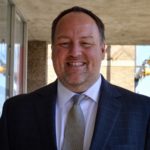 Craig Nash has lived in Waco since 2000. Since then he has worked at Baylor, been a seminary student, managed a hotel restaurant, been the “Barnes and Noble guy,” pastored a church and once again works for Baylor through the Texas Hunger Initiative. He lives with his dog Jane, religiously re-watches the same 4 series on Netflix over and over again, and considers himself an amateur country music historian.
Craig Nash has lived in Waco since 2000. Since then he has worked at Baylor, been a seminary student, managed a hotel restaurant, been the “Barnes and Noble guy,” pastored a church and once again works for Baylor through the Texas Hunger Initiative. He lives with his dog Jane, religiously re-watches the same 4 series on Netflix over and over again, and considers himself an amateur country music historian.
The Act Locally Waco blog publishes posts with a connection to these aspirations for Waco. If you are interested in writing for the Act Locally Waco Blog, please email [email protected] for more information.
By Beth Armstrong
It was another warm September morning in 2015 when I was in my car driving to my next appointment for work. I was listening to the radio, as I often do, and heard the news of another, the fourth, police officer who had been shot and killed while on duty. His death was the most recent in a series of killings over the span of a few weeks that had taken place across the country last summer. Not wanting to deal with anymore horrific news, I turned off the radio and drove on in silence for the next few miles. I thought to myself, someone should do something. Someone should change the conversation. Someone should stand up and DO SOMETHING; ANYTHING. In that moment, I heard a quiet voice whisper, “You’re somebody. Why don’t you?”
I am just a wife. I just a mom. I am just an employee. I am just a volunteer. I have no ties or connections to law enforcement. What could I possibly do? I drove on towards my destination that morning with that feeling that I should ‘do something’ lingering. As if a switched flipped in my mind, I thought about the national movement of “See You At The Pole” where students across the country gather at their flag poles one morning each September and pray for their school. What if we gathered at our local police stations and did just that? Prayed. Pray for safety; pray for integrity; pray for hearts to be changed? Whatever it is that you feel led to pray for, what if we prayed?
I 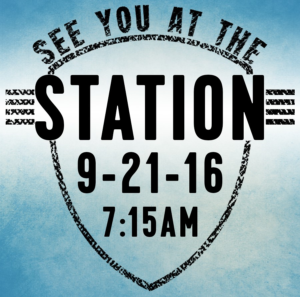 posted that simple idea on my Facebook page and within minutes had dozens of comments. A few hours later, I created a Facebook event page and titled it, “See You At The Station” in honor of the national, “See You At The Pole” rallies. In 36 hours, over 30,000 people had been invited. By the end of the second week, it had spread across the country to over 30 states. Our short window of 3 weeks, led to 65,000 people being invited in 35 states, hundreds of locations and thousands of people involved. Picture after picture after picture of people encircling their local police station gathered in prayer were posted the morning of the 2015 See You At The Station event. Pictures of groups of 1 or two people, dozens of people, and groups of hundreds were shared. For the people who came to pray or to be prayed over, I believe it changed them. For me, I know it forever changed me.
posted that simple idea on my Facebook page and within minutes had dozens of comments. A few hours later, I created a Facebook event page and titled it, “See You At The Station” in honor of the national, “See You At The Pole” rallies. In 36 hours, over 30,000 people had been invited. By the end of the second week, it had spread across the country to over 30 states. Our short window of 3 weeks, led to 65,000 people being invited in 35 states, hundreds of locations and thousands of people involved. Picture after picture after picture of people encircling their local police station gathered in prayer were posted the morning of the 2015 See You At The Station event. Pictures of groups of 1 or two people, dozens of people, and groups of hundreds were shared. For the people who came to pray or to be prayed over, I believe it changed them. For me, I know it forever changed me.
It is once again September. This month, we have two different opportunities to pray for our community. For those of us involved with SYATS, we still believe that the men and women who serve and protect us across the nation could use our prayer. So, I’m inviting you to come; pray. On Wednesday, September 21 at 7:15am wherever you live in whatever state, find your nearest police station and go pray for the men and women who work there. The following week, on Wednesday, September 28, students and their families across the country will be gathering at flagpoles before the start of school to pray over their campus and all who step foot there.
We often talk about wanting ‘Someone’ to ‘Do Something’. What if that ‘Someone’ is YOU? YOU could be somebody’s miracle. YOU CAN DO SOMETHING. Sometimes it requires feeling a little unsure; a little uneasy but taking a bold step of faith and courage to make a difference. You praying for these men and women might change them and impact their life, but if you let it, it might also change you and your life. Will you join with me and pray on Wednesday, September 21 at 7:15am, wherever you live, go to your local police station and just pray? I hope to See YOU At The Station too!
If you’d like more information about SYATS or want to share it with others, please check out the Facebook page: https://www.facebook.com/seeyouatthestation/
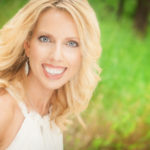 Beth Armstrong is married to Chris, and they have 2 kiddos: Hunter who is almost seven and Ella who just turned two. I addition to her fulltime job, she has been a member of the Junior League of Waco for 13 years.
Beth Armstrong is married to Chris, and they have 2 kiddos: Hunter who is almost seven and Ella who just turned two. I addition to her fulltime job, she has been a member of the Junior League of Waco for 13 years.
The Act Locally Waco blog publishes posts with a connection to these aspirations for Waco. If you are interested in writing for the Act Locally Waco Blog, please email [email protected] for more
By Leilani Mueller
Three nights ago Felicity, my one-year-old daughter, tried running. She was wearing her long maxi-dress, with the ruffles around the top and the bottom. She tried with all her little might to run after her two-year-old friend who had a ball. Into the long grass, she went. The thick grass was taller than her knees. She stumbled on the grass and her skirt, but stood up again, and again. She tried so hard.
Three weeks ago she took her first step in California. Three weeks ago I was living in California. Not anymore.
People ask, “How do you like Waco? What do you think of moving?”
Putting into words the experience of moving is difficult. On the one hand, there is something so ordinary about it. Yesterday, I sang to my baby and put her to bed. This morning, I went for my mile run. I dropped Nathan off at school, carpooling, the same as we’ve always done. Yet, it is different. Here, Felicity has a room of her own. The brick buildings of the classically, beautiful Baylor campus put Makita Tool company’s white, rectangular office to aesthetic shame. And the air is thick here. It sticks to you when you run. You notice it. Three weeks is not enough time to really know what I think.
As I reflect, I wonder about the story I choose to tell about this place. I find myself wondering, can I determine my experience of Waco? (Clearly, I’m motivated by the fact that my husband is a philosopher) Over the past six months, when I told people I was moving to Waco a range of responses came my way.
“It’s the armpit of Texas.”
“Growing up here is the best.”
“It’s exciting.”
“I hate it.”
“I love it.”
And the one agreed upon thought: “It’s hot in the summer.”
One place manages to elicit a range of contrary emotions. Perhaps the place is just a backdrop. It is me who gets to decide who I will be in this place. And I can love it as much as the familiar streets of Harbor City, the eclectic eateries in Los Angeles, the winding pavement of Oxford. But to love it, is also to admit that it is not those other places. And it is OK to miss them. But it is also OK to love this place, which isn’t to be disloyal to the other places I belong.
My experience of Waco is a walking one. I try to run in this thick new grass, but I will stumble sometimes.
 Leilani Mueller is a wife, mother, teacher, and writer. Formerly, a California native she now calls Waco home. She loves YA novels, Shakespeare, Victorian literature, Baylor philosophy, and Pumpkin Spice Lattes.
Leilani Mueller is a wife, mother, teacher, and writer. Formerly, a California native she now calls Waco home. She loves YA novels, Shakespeare, Victorian literature, Baylor philosophy, and Pumpkin Spice Lattes.
The Act Locally Waco blog publishes posts with a connection to these aspirations for Waco. If you are interested in writing for the Act Locally Waco Blog, please email [email protected] for more information.
